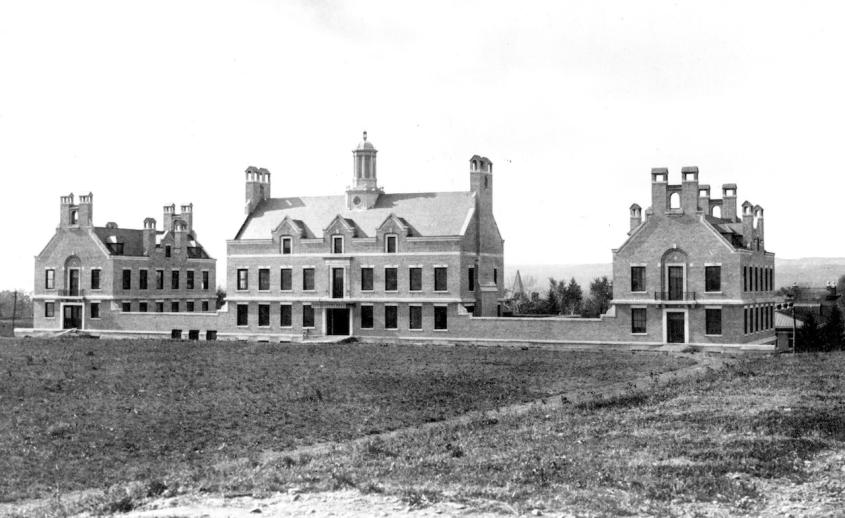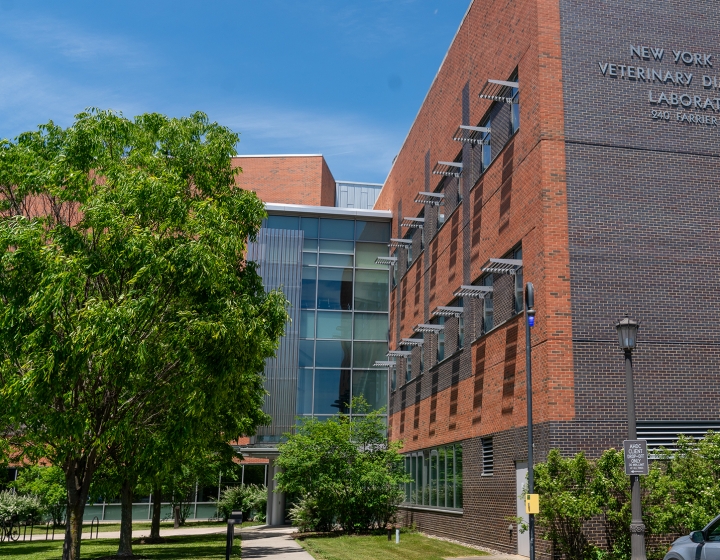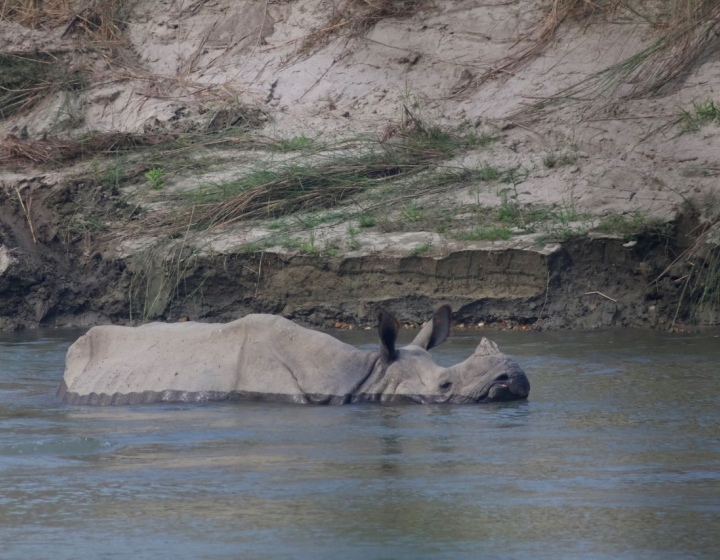A history of firsts: Curd, Miller and Woods forge a path
Although the College of Veterinary Medicine’s earliest Black men scholars and graduates joined Cornell in the 1890s, progress was slower for Black women, who saw their first graduates in 1977. Kirskey Louis Curd, D.V.M. 1912, is our first Black alumnus, and Lila Miller ’74, D.V.M. ’77, and Rochelle Woods ’74, D.V.M. ’77, are our pioneering Black alumnae.
A long 65 years passed between Curd’s graduation and that of Miller and Woods — that’s approximately half of the college’s time in existence. Now, it’s approaching 46 years between their graduation and that of the D.V.M. Class of 2023.
Kirskey Louis Curd, D.V.M. 1912, stands out as a luminary among College of Veterinary Medicine alumni, not only for being its first Black veterinary graduate, but for Curd’s exceptional, multitalented expertise that spanned both the veterinary and human medicine fields. Our previous profile showcases Dr. Augustus Nathaniel Lushington, who took veterinary courses in the college’s earliest years, but attended the University of Pennsylvania for his doctorate. It would be another 20 years before the College of Veterinary Medicine welcomed Curd to its program. For context, Curd was born around the time that Lushington studied at Cornell, yet he still held the distinction of being the college’s first Black alumnus.
Dr. Kirksey Louis Curd: Physician, veteran, erstwhile veterinarian

Born Feb. 25, 1888 in Paducah, Kentucky to Albert Curtis Curd, Sr. and Ida McFadden Curd Gilmer, Kirksey Louis Curd spent much of his young life in Perry, Oklahoma. A celebrated student from a young age, Curd attended Langston University, a land-grant institution then known as the Colored Agricultural & Normal University of Oklahoma. He continued as a star pupil at Kansas State University, formerly Kansas Agricultural College, where in 1910 he was noted for his excellent grades in anatomy, histology, physiology and associated laboratories. From Kansas, Curd then transferred to Cornell and upstate New York — first establishing himself in Buffalo, perhaps to gain state residency, which would have granted him free tuition to the Veterinary College.
While at Cornell, Curd was active in the student body as a member of Alpha Phi Alpha, a newly established fraternity for Black students across campus, and in the Society of Comparative Medicine, a student veterinary college organization. When he received his D.V.M. in 1912 at age 24, he became Cornell’s first Black veterinary graduate.
Curd’s passion for medicine was not restricted to the veterinary field. Indeed, after earning his doctorate in veterinary medicine, he immediately entered medical school at the University of Pennsylvania in Philadelphia, graduating with his M.D. in 1917. Curd worked as both a porter and waiter to fund his studies. World War I was in full swing upon graduation, and he joined the U.S. Army Reserves, serving as a first lieutenant within the Army Medical Corps. After his tour of duty, Curd married Ursula Alberta Guy in 1919. Together the Curds made a permanent home in Chester, a neighborhood of Philadelphia.
Curd spent most of his professional life as a practicing physician, despite being Cornell’s first Black veterinary graduate. He operated out of offices on West Master Street in Philadelphia, and was an attending at the Frederick Douglass Memorial Hospital and Training School, which was the first Black-run hospital in Philadelphia and the second in the nation.

As a chief doctor and department head at Frederick Douglass Memorial Hospital, Curd became a prominent member of the Black community in Chester and the larger Philadelphia area, alongside his wife Ursula. Together, they were involved in local Masons, Odd Fellows and Elks chapters. Curd was president and treasurer of the Abyssinian Progressive Association of Chester; a member of the Franklin Institute and the Philadelphia County Board of Assistance; rector’s warden of the Church of the Annunciation; and first president of the graduate chapter of the Alpha Phi Alpha fraternity in Philadelphia. He also was a member of the Philadelphia, Pennsylvania and American Medical Associations.
Dr. Kirksey Curd passed away in 1967 at age 79, and is buried at Mount Lawn Cemetery in Ardmore.
Drs. Lila Miller and Rochelle Woods: Pioneering pair

As the first two Black women to graduate from the College of Veterinary Medicine, Drs. Lila Miller and Rochelle Woods are often talked about as a pair. Both of these pioneers also did their bachelor’s at Cornell, each in animal science.
In other articles and interviews, Miller has described the challenging, often demoralizing educational environment at the time — although it was certainly progress to have Black women in the program, not everyone made them feel welcome. Miller recalled outright racist encounters that left her questioning whether to go into private practice after graduation, including slurs and pejorative nicknames. Although Black men graduates had come before them and were among their peers, Miller and Woods faced adversity and extraordinary pressure for being trailblazers for Black women in the profession — in addition to the regular rigors of veterinary medicine. Despite this fact, Miller and Woods made an enormous impact both at Cornell and in the world of veterinary medicine.
Hailing from Harlem, New York, and now famous for being the mother of shelter medicine, Miller decided to work with the New York City ASPCA branch after her graduation from Cornell. It wasn’t long before she revolutionized the shelter system there with new standards and protocols, quickly rising through the ranks. Her innovative approaches and insightful work on this topic consequently created an entirely new field: shelter medicine.
Miller has been an agent for change during her long career. She has written nationwide protocols and textbooks, and became a subject matter expert in animal abuse. In 1999, she returned to Cornell to teach a shelter medicine class — the first of its kind in the nation — and has served as an adjunct professor both at Cornell and at the University of Pennsylvania School of Veterinary Medicine. She has had an illustrious career with the ASPCA, first as director of the Brooklyn clinic, then as a veterinary advisor, as vice president of veterinary outreach and ultimately as vice president of shelter medicine. She is also co-founder and past-president of the Association of Shelter Veterinarians.

Miller retired in 2019, after 40 years of firsts and forerunning. In 2021, she was given the Avanzino Leadership Award from Maddie’s® Fund. The award includes a $25,000 grant, and the designation of July 10 as ‘Dr. Lila Miller Shelter Medicine Day’ in New York City, which displayed her image on a Times Square billboard. Miller donated this grant to Animal Care Centers of New York City.
Much has been written about Miller and her enormous impact on veterinary medicine, including this recent profile in Cornellians, and several news items from Maddie’s ® Shelter Medicine Program here and here.
Woods likewise has had a long, dedicated career. Originally from Buffalo, New York, Woods came to Cornell to study animal science, graduating with her bachelor’s in 1974. She then entered the program at the College of Veterinary Medicine — and thus the annals of history.
Woods had several plans upon graduation, listing world travel and a small animal practice among her hopes in the class yearbook. This shifted, however, as she quickly pursued a career with the U.S. Department of Agriculture. There, Woods served as a veterinary medical officer with the Animal and Plant Health Inspection Service (APHIS). APHIS was a relatively young organization at the time, having been established only five years before, in 1972. Woods’ Cornell training made her a good fit for the veterinary services section of APHIS, whose overall goal is to protect the health and value of the nation’s agricultural resources. Woods served this organization for 30 before her retirement.
As recently as December 2022, Woods was granted honor roll status with the American Veterinary Medical Association.
Immense impact
The impact of their work and that of other pioneering Black women veterinary leaders is immense. After their graduation in 1977, then followed Dianne Garnes, D.V.M. ’78; Anita Foote, D.V.M. ’79; Lorraine Watson, D.V.M. ’81; Julie Butler, D.V.M. ’83 — whose impact recently inspired a scholarship in her name; and the many others after them.
Like the college’s earliest Black men graduates, these alumnae forged a path for others to follow. Indeed, Curd took first step in our history; Miller and Woods took the next crucial step, and greatly expanded both representation and expertise in the profession.
We encourage you to read through the additional resources below to learn more about the remarkable lives of these pioneering graduates and the history they made at Cornell.
Researched by Susanne Whitaker
Written by Melanie Greaver Cordova
There is much more about the lives of Dr. Kirksey, Ursula Curd, Dr. Lila Miller and Dr. Rochelle Woods available to read at the below references.
- “Austin Culmer, 82, Local Radio Pioneer.” Philadelphia Daily News. November 5, 2008.
- Blaine School Exercises. Daily Enterprise-Times. June 9, 1903.
- “Celebrating Black History: The Legacy of Ursula Guy Curd (Piano ’26).” Curtis Institute of Music.
- “Concert Friday at Douglass.” Delaware County Daily Times. March 26, 1947.
- “Curd, Kirksey L.” Cornell Alumni Directory, 1922.
- “Curd, Kirksey L.” The Kentucky African American Encyclopedia, 2015.
- “Curd, Kirksey L.” Who’s Who in Colored America: A Biographical Dictionary of Notable Living Persons of African Descent in America from 1930-1931, 1932.
- “Day 23 – Dr. Lila Miller.” The American Blackstory. Feb. 23, 2022.
- “Douglass Memorial Hospital and Training School: The Origins of Mercy-Douglass Hospital.” In Her Own Right: A Century of Women's Activism, 1820-1920. December 5, 2019.
- “Dr. Lila Miller Receives Avanzino Leadership Award from Maddie’s Fund.” Maddie’s ® Shelter Medicine Program. Aug. 30, 2021.
- “The First But Not the Last.” Multicultural Veterinary Medical Association.
- “Frederick Douglass Memorial Hospital and Training School.” Philadelphia: World’s Medical Gazette.
- “Guy-Curd.” Topeka Plaindealer. March 7, 1919.
- History of Langston University.
- “Honor roll members inducted – January 2023.” AVMA. Dec. 13, 2022.
- “Interview with Dr. Lila Miller and Getting to Zero.” SmallAnimalTalk.com. Sept. 5, 2013.
- “July 10, 2021 Proclaimed "Dr. Lila Miller Shelter Medicine Day.” Cision. July 10, 2021.
- “Kirksey L. Curd, Physician, at 79.” Philadelphia Inquirer. April 18, 1976.
- “Kirksey Louis Curd.” Cornell Class Book: A record of the class of 1912. Vol. XVI, 1912.
- “Maddie’s Candid Conversation with Dr. Lila Miller.” Maddie’s ® Fund. Aug. 24, 2021.
- Marriage announcement. Topeka Daily State Journal marriage announcement. February 19, 1919.
- “Marriage of Dr. K. L. Curd.” Kansas City Advocate. March 7, 1919.
- “The Mother of Shelter Medicine.” Cornellians. Oct. 25, 2021.
- ”Remembering a Renaissance woman: Alumna’s impact inspires scholarship for under-represented students.” Cornell College of Veterinary Medicine. April 28, 2021.
- “The Rise and Decline of African-American Hospitals in Philadelphia.” Hidden City. October 2, 2020.
- Ursula Curd Culmer. Find-a-Grave.
- “A Veterinary Student’s Contribution to the History of the African-American D.V.M. Education.” Perspectives in Veterinary Medicine, 2014.






